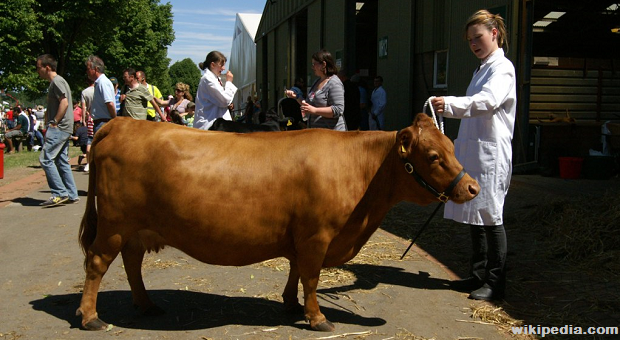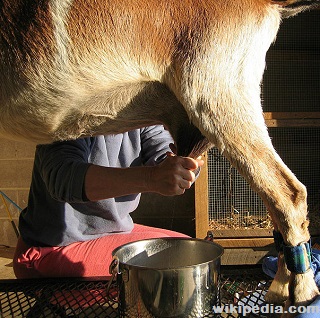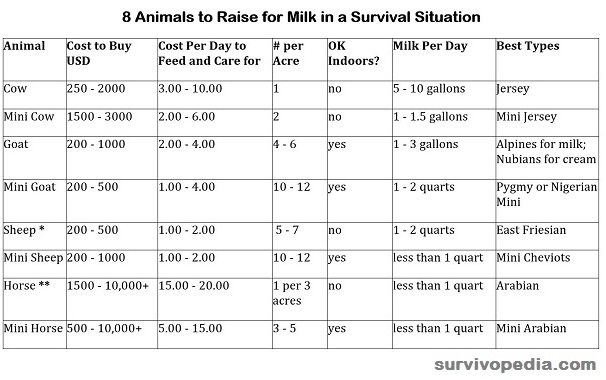 Some preppers believe that they can avoid having anything to do with raising animals if they condition themselves to live on a vegan diet. While careful attention to detail can make this a healthy diet choice, it does not pay to rely on container gardens and aquaponics when there may be times when you will need to rely on animal meat and milk.
Some preppers believe that they can avoid having anything to do with raising animals if they condition themselves to live on a vegan diet. While careful attention to detail can make this a healthy diet choice, it does not pay to rely on container gardens and aquaponics when there may be times when you will need to rely on animal meat and milk.
For example, if you cannot grow enough mushrooms or develop a strain of brewer’s yeast for vitamin B-12, you will need to eat meat. At the very least, if you have one or two animals on hand that can be used for milk production and meat, you will be able to stave off malnutrition long enough to pursue other food options.
Choosing Animals Based on Land Availability and Transport
Animals to Raise for MilkIt is very important to realize that it may not be possible to have a cow living in your attic, or goats  frolicking around in your rented city dweller living room.
frolicking around in your rented city dweller living room.
In addition, if you have to move quickly from one place to another, it will be very hard to move large farm animals.
While you may be able to get away with moving 2 – 3 animals that are around the same size as a large dog, anything else won’t be very practical.
From that perspective, if you are going to start raising animals for milk and meat now, it might make sense to go with “mini” breeds, that are more adaptable to your current living conditions. That said, if you already have a few acres of land or have farm property, then you can purchase larger animals and start working with them.
A Special Note for Apartment and City Dwellers
There is nothing worse than being stuck in a city or apartment building with no food and no way to tangibly prepare for survival needs. Even if your landlord says you cannot have pets, you are allowed to have them if your doctor gives you a letter stating that you need a medical service animal.
Contrary to popular belief, these federal laws don’t only protect dogs, they are meant for any kind of animal that may offer affection, companionship, or alert you to a medical issue. Therefore, if you want to have mini farm animals, it should be possible for you to have them in your apartment; provided there is enough room and you take proper care of them.
At the very least, you can find out more about how service animal laws are managed in your local area and take steps to get your paperwork in order.

* Note – It is still relatively difficult to buy dairy quality sheep in the United States. It is best to locate a working dairy sheep farm and see if you can purchase lambs from them.
** Note – Milking horses can be difficult and dangerous. Horse milk is, however, considered a delicacy in gourmet foods, and also in the fermented form.
Raising the Next Generation
It is very easy for people not raised on farms to believe that cows and other mammals give milk all year round. In reality, mammals must give birth before they start secreting milk.
Today, most dairy producers use artificial insemination to force female mammals to get pregnant, and then take the young away as soon as they are born. Since these animals are usually hybrid varieties, it is not possible to propagate from generation to generation using natural methods.
When it comes to choosing animals for your own farm, it will be best to work with heritage varieties; or for mini animals, once that are certified capable of producing viable offspring. While these animals may cost a bit more, at least you will be able to build up a herd and keep them going for decades.
Needless to say, you will also need to study population genetics so that you know how many animals to buy and keep at any given time to prevent excessive inbreeding.
Managing Medical Issues
If you have cats or dogs, then you may not be accustomed to the kinds of routine medical care associated with keeping farm animals. This includes a whole host of different diseases to watch out for as well as a much more robust inoculation schedule.
Even though these shots will not be available in a crisis scenario, it is very important to be educated about all the diseases farm animals can develop, as well as how to avoid them. Depending on where you live, including access to a veterinarian that is also a prepper will be of immense benefit.
Regardless of whether you need access to antibiotics or don’t know how to turn an animal around in the womb, this person can help you with those problems now as well as in a disaster scenario.
Keeping Your Milk and Cheese Supply Safe to Consume
Aside from pasteurizing milk and cheese products, it is also very important to keep your tools and equipment clean. Since you will most likely be using bacteria cultures to make various cheese products, it is very important to keep these strains uncontaminated.
If at all possible, it would be best to have a room set aside exclusively for raising cheese cultures and the equipment used for that purpose. Here are some additional things that will help you keep cheeses and milk safe and ready to use when needed:
Have a root cellar or other naturally cool, dry place where cheeses can be stored
Can milk to preserve it and prevent it from going bad
Always date cheeses and milk products, plus add an approximate expiration date to each label. Use older dairy products first so that you avoid wasting food due to rotting or loss of quality.
Overall, you will find that milk is either drunk directly or turned into cheeses and butters for food. You can also ferment milk for alcoholic beverages. Depending on the alcohol tolerance level of the yeast, and the amount of sugar/honey added to the milk, you can easily make beverages with a fairly high alcohol content.
For medicinal wines and wound sterilization, use a still to concentrate the alcohol, and then store for later use.
Here are some other ways you can use milk that have nothing to do with food based applications:
Place on sun burned skin to relieve burning and pain,
Mix with salt to reduce itching from bug bites,
Clean hands with a mix of oatmeal and milk. Can also be used as a facial cleanser
Treat Poison Ivy with ice cold milk. Just be sure not to let the milk spread to other areas because Poison Ivy oils spread easily and can damage more skin that way.
Many people that decide to raise animals for milk find it a rewarding and enjoyable experience. That said, if you are planning to save money, it may be some time before you break even on the initial purchase of land, animals, and equipment.
If you are interested in milk animals for survival purposes, planning out your farm area and getting started as soon as possible will be to your advantage.
Learn about an amazing way of becoming food independent in Backyard Liberty!
This article has been written by Carmela Tyrell for Survivopedia.
About Carmela Tyrell
Carmela Tyrrell is committed to off gridding for survival and every day life. She is currently working on combining vertical container gardening with hydroponics. Tyrrell is also exploring ways to integrate magnetic and solar power generation methods. On any given day, her husband and six cats give thanks that she has not yet blown up the house. You can send Carmela a message at carmela.tyrell [at] survivopedia.com.




